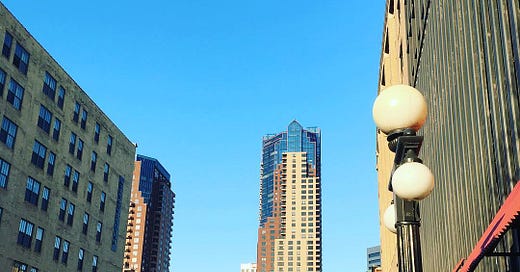Shortly after moving to Minnesota in 2017, my wife and I went to a St. Paul Saints game. Arriving early, we went for a walk around Lowertown and loved its variety of places to eat and drink — especially around Mears Park. We immediately decided to move there.
Seven years later, the place we fell in love with is dead.
The Barrio eatery closed in September after operating in Mears Park for 15 years. It is the latest in a long line of closures leaving only one bar or restaurant operating in the area.
Commercial and retail businesses ebb and flow in any given area. In a competitive economy, there will always be closures owing to mismanagement, competitor improvements, and changing consumer tastes. I could give examples of each among the closures in Lowertown and adjacent areas. However, these are usually offset by new businesses. This is largely not the case in Lowertown.
COVID-19 and state and local policy responses are the most commonly cited causes of this commercial distress. The period of “shutdowns” saw the closures of three venues in 2020: the Handsome Hog in June (although it moved to a new site in St. Paul), the Octo Fishbar in July, and the Hat Trick Lounge in September.
When the shutdowns ended, however, many of the workers stayed home. The First National Bank building, the Park Square Court building, the Empire Building, and the Alliance Center — more than 1.6 million square feet in commercial space in St. Paul — are currently on the market with, the Pioneer Press reports, “occupancy rates [that] average 50% or less and dropping.” The closures continued: Stacked Deck Brewing in October 2021, Black Dog Café in January 2022, Tin Whiskers Brewing in April 2022, and Black Sheep Pizza in May 2022. Noyes & Cutler and Big Biscuit Bar, which closed “temporarily” in June 2023, remain closed.
But problems had been discernible before COVID-19. Biergarten Germania closed in July 2018 and 12welve Eyes Brewing, World of Beer, and Elephant Bar closed in June, July, and September of 2019, the last replacing the short-lived Hygga. The pandemic didn’t start trends so much as accelerate them: Many of the area’s problems are the results of policy choices made by the city government over an extended period of time.
After all, the imposition of vaccine and testing mandates for bars and restaurants in St. Paul as late as 2022 was a deliberate policy choice made by the city government.
When Black Sheep Pizza closed, its owners blamed the construction of an expensive, seldom-used bikeway along 10th Street. This, too, was a deliberate policy choice made by the city government.
Nick Rahn, owner of the cannabis business The Warrior’s Garden, was featured in a Fox 9 news story, explaining, “more events could help, and he [Rahn] is hosting comedy shows to do his part, but he’s having to jump through some hoops with the city.” The imposition of these regulatory burdens was a deliberate policy choice made by the city government.
Reflecting on Barrio’s closure, Fox 9 quoted St. Paul Planning Commissioner Nate Hood, pointing out that the city “has a higher minimum wage than most of its suburban neighbors, and taxes and rent are typically higher.” The imposition of a higher minimum wage rate, which even research commissioned by the city itself would reduce employment, a rent control law that effectively ended the construction of residential properties in St. Paul, and rates of sales tax higher than in neighboring areas were all deliberate policy choices made by the city government.
So, too, is the decision to indulge anti-social behavior. Annie Rose, owner of the Lost Fox opposite the Union Depot light rail station, told Fox 9 that she “doesn’t get a lot of foot traffic because of safety concerns on the Light Rail.” “It’s not where it should be in my open [sic], so we don’t get a lot of foot traffic,” Rose said. Indeed, my wife and I departed Lowertown in 2020 after my one-year-old son and I passed a man stretched out on the pavement outside Union Depot experiencing a drug overdose.
What bad policy has done can be undone by good policy. Lowertown, and St. Paul generally, are failing because they have been woefully led over an extended period. The city has been subjected to a thorough treatment of “progressive” policies with predictable results. If these same policies are implemented statewide or nationwide for an extended period, we will see the same results.
Occasionally, I’ll be driving on Highway 52, see Lowertown, and tell my son that is the first place he ever lived. I also tell him that it was a great place to live once upon a time and that I hope it is again when the time comes for him to find his own place. Better leadership and better policy are a necessary first step for its recovery.




Same thing happened to Uptown Minneapolis. Used to be a fun place to go with (eg) Chino Latino, Stella’s, Calhoun Square, the arthouse theaters, Uncommon Grounds, etc., but unless something has changed since I was last there a year or two ago, it’s almost entirely shut down now.